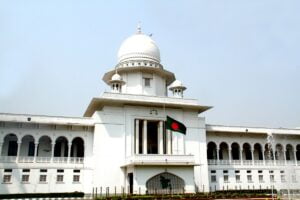ButSpeak.com
News which Matters.

Student-led protesters besiege Bangladesh’s Supreme Court, demanding the resignation of all judges, including Chief Justice Obaidul Hassan, amid political turmoil.
Bangladesh’s Supreme Court found itself at the center of a growing political crisis on Saturday, August 10, as hundreds of student protesters besieged the building, demanding the resignation of all judges, including Chief Justice Obaidul Hassan. The demonstration comes just days after former Prime Minister and Awami League leader Sheikh Hasina was forced into exile following a student-led uprising that has plunged the nation into turmoil.
The protesters, joined by several lawyers, have reportedly given the Supreme Court judges a one-hour deadline to step down. They have warned that if their demands are not met, they will escalate their actions by besieging the judges’ residences. The tense situation has already prompted reports that Chief Justice Obaidul Hassan, who was appointed last year and is considered a loyalist to the ousted Prime Minister, may have left the building to avoid a confrontation with the protesters.
In a significant development, sources suggest that Chief Justice Hassan has agreed “in principle” to resign, following the ultimatum from the protesters. This move is seen as a response to the intense pressure from the demonstrators, who have been relentless in their demands for judicial accountability.
The political unrest in Bangladesh has been further compounded by the resignation of Bangladesh Bank Governor Abdur Rouf Talukder. His decision to step down came just one day after protesters stormed the central bank’s headquarters, amid widespread dissatisfaction with the current government’s handling of the crisis. Talukder cited “personal reasons” for his resignation, but the timing suggests it is closely linked to the ongoing political upheaval.
The situation remains volatile as the protesters continue to push for the resignations of the Supreme Court judges. With the deadline fast approaching, there are growing concerns that the standoff could lead to further escalation, potentially destabilizing the already fragile political landscape in Bangladesh.
This wave of protests and resignations marks a critical juncture in Bangladesh’s political history, as the country grapples with the aftermath of Sheikh Hasina’s forced exile and the rising demands for systemic change. All eyes are now on the Supreme Court and the broader judicial system, as the nation awaits the outcome of this high-stakes confrontation.